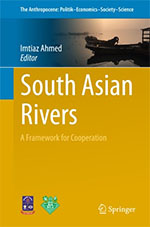
The Anthropocene
Politik – Economics – Society – Science (APESS))
Edited by
Hans Günter Brauch,
AFES-PRESS, chairman
Free University of Berlin (Ret.)
A Peer Reviewed Book Series
ISSN: (Print)
ISSN: (Online)
APESS
Vol 21 |
Imtiaz Ahmed: South Asian Rivers. A Framework for Cooperation (Cham: Springer- Springer International Publishing, 2018).
ISBN: 978-3-319-67373-8 (Softcover)
ISBN: 978-3-319-67374-5 (EBook)
Doi: 10.1007/978-3-319-67374-5 (add chapter no.)
Order this book on Springer Website
|

|
- Identifies existing statist approaches and political economies of river management in South Asia
- Leads readers on a journey through the transboundary rivers of South Asia where rivers are vital for life and living
- Explains why the region needs a framework for cooperation on the wellbeing of these rivers
- Provides insight into the future of transboundary water governance in South Asia
This book identifies the statist approach and political economy of river management in South Asia. Transboundary rivers are holy for millions of people and vital for their life. They are suffering much. A framework for cooperation for the wellbeing of these rivers is needed. River management is key to sustaining the healthy river systems. The right of the rivers must be codified and guaranteed by the state and the people in South Asia. Transboundary rivers in South Asia are conceived as national rivers. This volume contributes to the campaign of overcoming water dystopias in South Asia. The introduction and four chapters reflect on the South Asian experience of national and international legal aspects of river water sharing, existing agreements and institutions of river management and on the future of water governance. The book stresses that South Asian rivers must be treated as an ecological reality governed on common principles of cooperation and legal grounds supported by the people. |